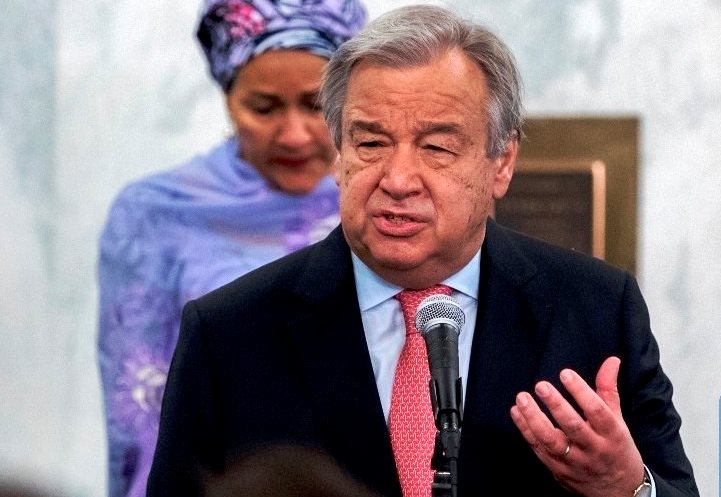UN Secretary-General Antonio Guterres has warned that the ongoing violent conflict between Iran and Israel is “a fire no one can control” and risks spiralling out of control.
Guterres also warned that the world stood on the edge of catastrophe as Israel’s military campaign inside Iran intensified and strikes on nuclear facilities threatened to trigger a catastrophe.
The regional fallout is expanding, with missiles from Yemen’s Houthi forces targeting Israel and occupied Palestinian territory, while armed groups in Iraq are reportedly mobilising.
In an address to the UN Security Council on Friday, Guterres made an urgent plea for de-escalation, calling the spiralling confrontation a defining moment for the future of global security.
“We are not drifting toward crisis, we are racing toward it,” he said adding ,“This is a moment that could shape the fate of nations”.
“The expansion of this conflict could ignite a fire no one can control,” he stressed, warning of widespread panic and destruction.
The Secretary-General’s remarks came amid a mounting civilian toll in both Israel and Iran, and as several nuclear sites in Iran have come under direct military assault.
Over 100 targets have reportedly been struck across Iran, including military and nuclear infrastructure such as the Natanz and Isfahan nuclear facilities and the Khondab heavy water reactor.
Iranian officials reported over 224 civilian deaths, with some estimates twice as high and more than 2,500 have been reportedly injured.
Major cities like Tehran have seen mass displacements, fuel shortages and widespread panic.
Iran has responded with its own barrage of missile strikes on Israel, hitting cities such as Tel Aviv, Haifa and Beersheba.
Critical civilian sites, including the Soroka Medical Center and the Weizmann research institute, have been damaged.
No fewer than 24 Israelis were confirmed dead, with more than 900 injured.
Guterres urged both parties to give diplomacy a chance.
He reiterated the need for full Iranian cooperation with the UN nuclear energy watchdog, the International Atomic Energy Agency (IAEA).
UN nuclear chief gives grave warnings on Iran’s nuclear safety
Meanwhile, IAEA on Friday, gave the most alarming update on the ongoing Israel’s attacks on Iran’s nuclear facilities.
IAEA Director General, Rafael Grossi, warned the UN Security Council that Israeli attacks on Iranian nuclear facilities were degrading critical safety systems and placing millions at potential radiological risk.
Grossi said at Natanz, the destruction of electricity infrastructure and direct strikes on enrichment halls had led to internal contamination.
Grossi said while no radiological release has been detected outside the facility, warned that uranium compounds now posed significant health hazards within.
At Isfahan, the UN nuclear watchdog boss said multiple buildings including a uranium conversion plant and a metal processing facility, were hit.
At Arak’s Khondab reactor site, he said that damage was sustained, though the facility was not operational.
The greatest risk, however, he said, is the Bushehr Nuclear Power Plant, which remains operational.
Grossi warned that a direct strike “could result in a high release of radioactivity to the environment.”
He stressed that even a disruption of its external power supply could lead to a core meltdown.
In the worst-case scenario, radiation would affect populations hundreds of kilometres away and require mass evacuations, he warned.
Grossi also warned against any attack on the Tehran Nuclear Research Reactor, which could endanger millions in the capital.
“Nuclear facilities and material must not be shrouded by the fog of war,” he said. We must maintain communication, transparency and restraint,” the IAEA chief stressed.
Grossi pledged that the IAEA would continue to monitor and report on nuclear safety conditions in Iran and reiterated his readiness to mediate.
He stressed that the agency “can guarantee, through a watertight inspections system,” that nuclear weapons will not be developed in Iran, urging dialogue.
“The alternative is a protracted conflict and a looming nuclear threat that would erode the global non-proliferation regime,” he stressed.



